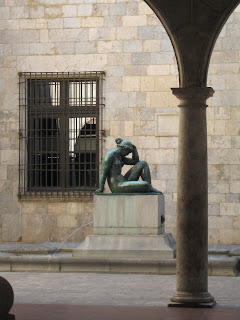One parting shot of a statue in Perpignan. There are many naked women statues in this city as elsewhere in the world, but I didn't see any naked men. Maybe I didn't look hard enough.
I did look for explanations, though, and found a book that I am poised to read: Women, Wealth and Community in Perpignan c.1250-1300, by Rebecca Lynn Winer (2006, Ashgate Publishing).
Yes, that's early in the history's city, but, not early enough. The image was too striking to stop there. I did a search for "human" on Wikipedia. Although there is a paragraph on gender roles, there isn't a gender analysis yet.
As a biologist interested in evolution and our brief human history on this planet, I can't help thinking about a trinity of attributes that emerges from this review: 1) over long distances humans can out-run most other animals on earth 2) human childbirth is dangerous compared with other animal species 3) humans have highly developed brains capable of abstract reasoning, tool design and their deployment.
So far, the Wikipedia entry does not discuss maternal instinct, women-to-women care (especially in labour), or story-telling in helping us humans get this far, though a new wave of anthropologists are working on topics like these right now. There is a paragraph on the long history of war, but no indication on how we can stop it. The explanation on "emotion" raises more questions than it answers.
Over the last two centuries, one outcome of our remarkable human ingenuity is the ability to determine our own reproductive future in certain regions of the world. In these regions, the risks of childbirth have been dramatically reduced, and we have produced inventions that allow free women and men to make their own choices about offspring.
But there is still not enough human reason and emotion in the world to remedy what we know exists, what is bothering us, and what is likely to hurt us all. These are the asymmetries and unfairness between different zones - regional, national and international. Ladies, it is my belief that womens' intellectual and emotional talents have yet to be fully born and utilized on this planet. Many of us are long from the tethers that held our mothers and grandmothers. So...what do we do next?
I did look for explanations, though, and found a book that I am poised to read: Women, Wealth and Community in Perpignan c.1250-1300, by Rebecca Lynn Winer (2006, Ashgate Publishing).
Yes, that's early in the history's city, but, not early enough. The image was too striking to stop there. I did a search for "human" on Wikipedia. Although there is a paragraph on gender roles, there isn't a gender analysis yet.
As a biologist interested in evolution and our brief human history on this planet, I can't help thinking about a trinity of attributes that emerges from this review: 1) over long distances humans can out-run most other animals on earth 2) human childbirth is dangerous compared with other animal species 3) humans have highly developed brains capable of abstract reasoning, tool design and their deployment.
So far, the Wikipedia entry does not discuss maternal instinct, women-to-women care (especially in labour), or story-telling in helping us humans get this far, though a new wave of anthropologists are working on topics like these right now. There is a paragraph on the long history of war, but no indication on how we can stop it. The explanation on "emotion" raises more questions than it answers.
Over the last two centuries, one outcome of our remarkable human ingenuity is the ability to determine our own reproductive future in certain regions of the world. In these regions, the risks of childbirth have been dramatically reduced, and we have produced inventions that allow free women and men to make their own choices about offspring.
But there is still not enough human reason and emotion in the world to remedy what we know exists, what is bothering us, and what is likely to hurt us all. These are the asymmetries and unfairness between different zones - regional, national and international. Ladies, it is my belief that womens' intellectual and emotional talents have yet to be fully born and utilized on this planet. Many of us are long from the tethers that held our mothers and grandmothers. So...what do we do next?


No comments:
Post a Comment